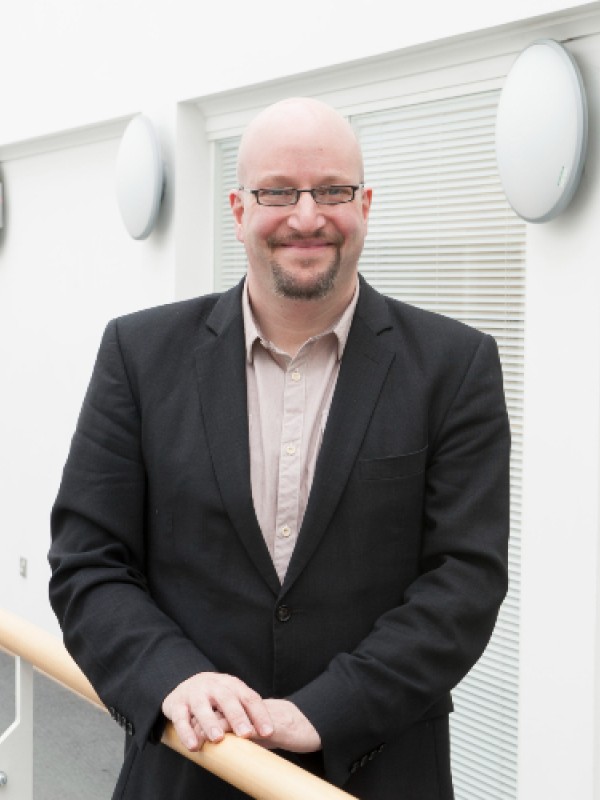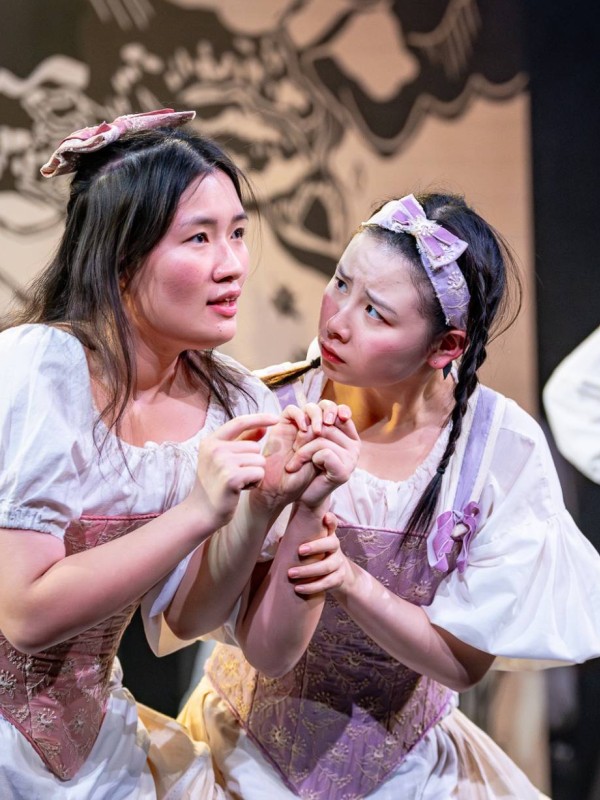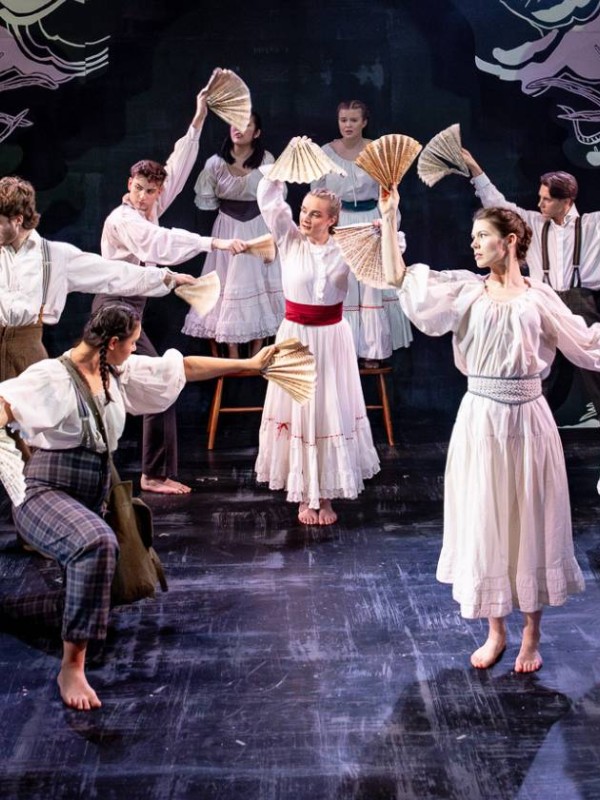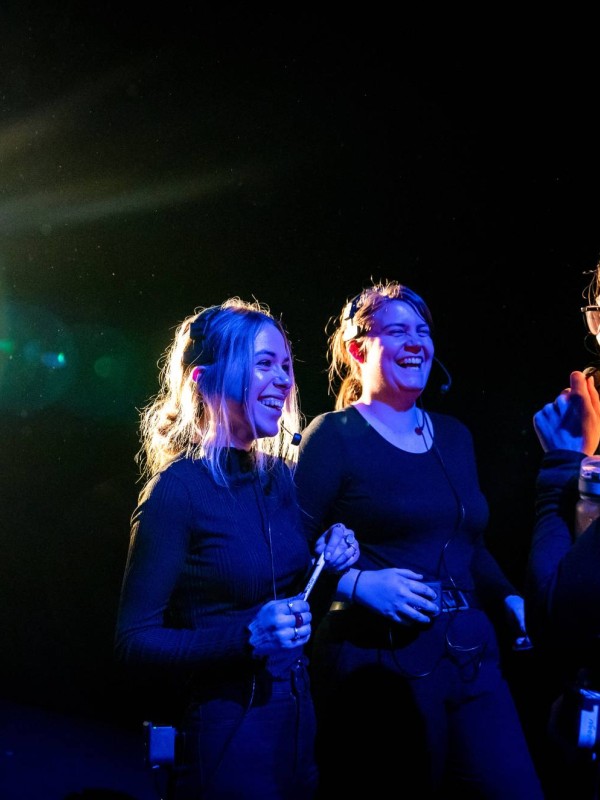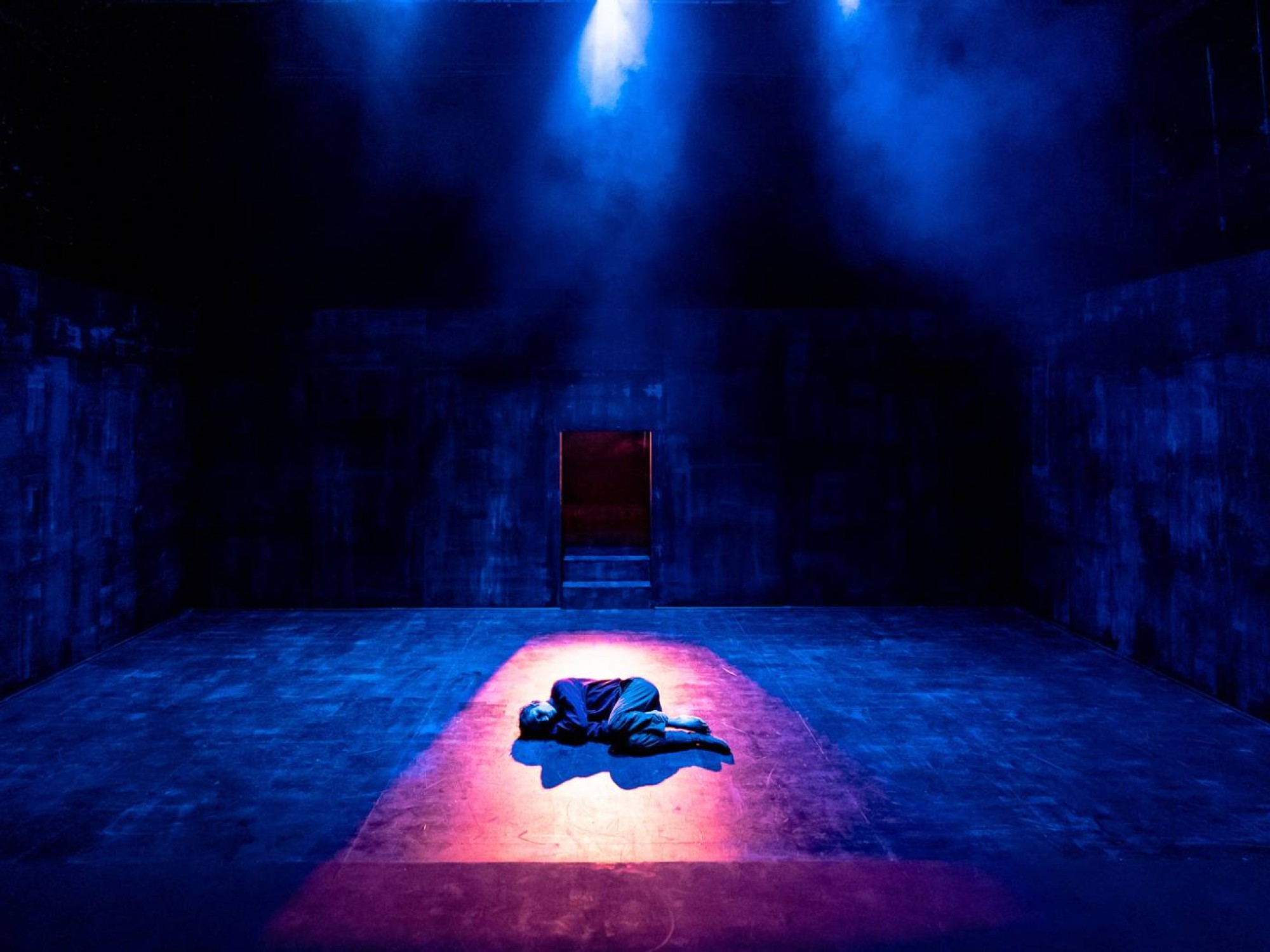
- Theatre
MFA — 2025 entry Theatre
Ideal for those in full-time employment or commitments, our Theatre MFA allows you to study at your own pace through distance learning, so you can pursue your passion for theatre and develop industry connections around your existing commitments or work. You leave with an internationally recognised qualification, a masters of fine art.
Why choose
this course?
- You’ll have unlimited access to our virtual learning environment where you’ll be supported by highly experienced and passionate tutors.
- You will interconnect with a geographically diverse cohort of students to develop your skillsets with minimal disruption to your ability to sustain family and/or career responsibilities, simultaneously developing resourcefulness and resilience.
- We will enhance your skills by taking you deeper into the fascinating history of theatre from both a practical and critical perspective, enabling you to acquire a rigorous critical understanding of theatre.
- You will be taught and advised by leading West End directors, casting agents, experienced professionals and leading academics, giving you a unique and comprehensive support network and knowledge base.
- Upon graduation, you will be well equipped with a range of professional and/or pedagogic practices, enabling you to widen your career prospects and employment opportunities. You will also be able to contribute more creatively and intelligently to your chosen field as a result of a developed contextual, analytical and critical awareness with an ability to apply that awareness to a variety of texts and/or contexts.
Statistics
Fantastic graduate prospects
94% of our GSA postgraduate students go on to employment or further study (Graduate Outcomes 2024, HESA)
Top 10 in UK
Surrey is ranked 9th in the UK for overall satisfaction (Postgraduate Taught Experience Survey 2023)
Top 20 in UK
Surrey is ranked in the top 20 for the quality of our research outputs (Research Excellence Framework 2021)
What you will study
Our Theatre (Distance Learning) MFA allows you to study at your own pace through online learning, so you can pursue your passion for theatre and develop industry connections around your existing commitments.
You’ll actively engage with fundamental principles and explore the rich heritage of theatre from a critical, historical and theoretical perspective. You’ll gain an understanding of theatrical practices and develop your ability to evaluate significant artistic, historical, social and political developments in theatre.
Our broad range of modules incorporates topics such as:
- The Greeks
- Shakespeare
- Naturalism and the Actor
- Modern Theatre
- Global Theatres
- Music and Dance in Theatre.
In addition, you will explore the background to theatre through history, philosophy, psychology, politics and cultural theory.
You will have the opportunity to enhance your professional development and you’ll complete an independent research project that will allow you to specialise in an area of particular interest to you.
You will also study pedagogies that will introduce you to key principles, skills and techniques required to facilitate training for performance in a range of settings across diverse communities, and develop your knowledge of areas in theatre, performance and relevant teaching practices.
The academic year is divided into two semesters of 15 weeks each. Each semester consists of a period of teaching, revision/directed learning and assessment.
The Guildford School of Acting (GSA) delivers its provision across three teaching blocks, within the University of Surrey’s existing semester structure.
The structure of our programmes follows clear educational aims that are tailored to each programme. These are all outlined in the programme specifications which include further details such as the learning outcomes:
Modules
Modules listed are indicative, reflecting the information available at the time of publication. Modules are subject to teaching availability, student demand and/or class size caps.
The University operates a credit framework for all taught programmes based on a 15-credit tariff, meaning all modules are comprised of multiples of 15 credits, up to a maximum of 120 credits.
Course options
Year 1
Semester 1
Compulsory
This module will engage students in the study of Ancient Greek Theatre, examining its origins, influence and impact. Topics to be studied include, but are not restricted to: Myth, Ritual, Performance Space, Politics, The Actor and The Playwright. Original performance contexts will be studied alongside diverse global historical and contemporary productions. This module seeks to empower and promote the social, economic and political inclusion of all, irrespective of age, sex, disability, race, ethnicity, origin, religion or economic or other status.
View full module detailsSemester 2
Compulsory
This module will engage students in the study of Shakespeare, examining his work, influence, impact and legacy upon theatre. Topics to be studied may include, but are not restricted to: The Tragedies, The Histories, The Comedies, Character, Themes, Language, and Shakespeare in Production. Original performance contexts will be studied alongside historical and modern productions, and students will have the freedom to investigate Shakespeare in non-Western theatre contexts. This module is committed to sustainable learning and research in both its content and manner of delivery. With respect to the former, it embraces and celebrates the global inclusiveness of Shakespeare’s works as a core component of an ongoing cultural conversation characterised by collaboration, tolerance and mutual respect. With regard to the latter, the methods of engagement with the module materials are interactive, supportive, dialogic and always positive, in that they are rooted in the interests and experience of an international online learning community.
View full module detailsThis module will engage students in the study of Naturalism, examining its origins, influence, impact and legacy upon theatre and actor training. Practitioners to be studied include, but are not restricted to: Ibsen, Strindberg, Chekhov, Stanislavski, Shaw, O'Neill. Original performance contexts will be studied alongside historical and contemporary development and contexts. Students will have the freedom to investigate Naturalism within the context of non-Western theatre practices if they wish.
View full module detailsSemester 1 & 2
Core
This module will engage students in the study of the history of theatre by focusing on key ideas and approaches that have formed the background to its development. Topics to be studied include, but are not restricted to, Humanism in Classical, Medieval, Renaissance, Enlightenment, Romantic and Realist theatres, Marxism, Feminism, Theatre Anthropology, Cognitive, Moral and Evolutionary Psychology, Semiotics, Phenomenology and Postmodern approaches. Exploration of how key concepts shed light upon practice will lead to examination of the aesthetic, communal, moral and political functions of theatre. While the module focuses upon Western cultural traditions to a substantial extent, students nonetheless have the freedom to research and write about themes and examples with global reach.
View full module detailsYear 2
Semester 1
Compulsory
This module will allow students to engage in study of contemporary theatre movements and traditions from the beginning of the 20th century to the present day. Practitioners and movements studied may include, but are not restricted to, Expressionism, Surrealism, Meyerhold, Agitprop, American Political Theatre of the 20th Century, Brecht and Epic Theatre, Documentary Theatre, In-Yer-Face Theatre, Kitchen Sink Theatre, Feminist Theatre, Theatre of the Absurd, Theatre of the Oppressed, Verbatim Theatre, Immersive Theatre, Site-Specific Theatre, Applied Theatre. Students will have the freedom to research into non-Western contemporary theatre practices where these align with the module content.
View full module detailsSemester 2
Compulsory
This module will engage students in the study of music and dance forms in Western theatre. Movements and practitioners studied include, but are not restricted to, Musical theatre (the Book Musical, the Concept Musical, the Revue Musical, the Juke Box Musical and the Rock/Pop Musical, the Mega Musical, the contemporary musical); opera; ballet; modern and contemporary dance; contemporary mixed dance/physical theatre companies. Students will have the freedom to investigate non-Western contexts, influences and practices where these reflect the module aims and content.
View full module detailsSemester 1 & 2
Compulsory
This module will allow students to engage in study of non-Western theatre movements and traditions. Practitioners and movements studied may include, but are not restricted to, theatre traditions of Japan, China, India, South-East Asia, Africa, Arabic theatre, the Pacific, such as Noh, Kabuki, Bunraku, Butoh, Kyogen, Beijing Opera, Balinese Theatre, Wayang Kulit, West African griot.
View full module detailsThis module will afford students the opportunity to engage in reflective analysis of their personal professional development. Through discussion and task-based activities, students will critically reflect upon steps taken so far, will identify further action and detail potential professional development opportunities and methods. Students are also free to include creative work in the portfolio such as a sample of professional script or a video recording of the student's own practice. The module's reach allows for students to approach the creation of the portfolio in line with their cultural background and preferences.
View full module detailsYear 3
Semester 1
Compulsory
This module introduces students to key principles, skills and techniques required to facilitate training for performance across a variety of teaching and learning contexts, including, but not limited to, schools, community groups, education outreach activities, professional training and online learning across diverse communities. Learning and teaching processes will be examined through the lenses of acting, voice and movement and the application applied through analysis of performance Through the development of their teaching practice, students will be encouraged to empower and promote the social, economic and political inclusion of all, irrespective of age, sex, disability, race, ethnicity, origin, religion or economic or other status.
View full module detailsSemester 2
Compulsory
This module enables the student to develop their theoretical knowledge of either areas of theatre, dance and performance or the pedagogies of acting, voice and movement for professional performance or teaching. The module is centered on the creation of an independent research project that reflects the student¿s own professional and creative interests.
View full module detailsGeneral course information
Contact hours
Contact hours can vary across our modules. Full details of the contact hours for each module are available from the University of Surrey's module catalogue. See the modules section for more information.
Timetable
Course timetables are normally available one month before the start of the semester.
New students will receive their personalised timetable in Welcome Week, and in subsequent semesters, two weeks prior to the start of semester.
Please note that while we make every effort to ensure that timetables are as student-friendly as possible, scheduled teaching can take place on any day of the week (Monday – Friday). Wednesday afternoons are normally reserved for sports and cultural activities. Part-time classes are normally scheduled on one or two days per week, details of which can be obtained from Academic Administration.
We offer careers information, advice and guidance to all students whilst studying with us, which is extended to our alumni for three years after leaving the University.
94 per cent of our Guildford School of Acting postgraduate students go on to employment or further study (Graduate Outcomes 2024, HESA).
GSA offers careers advice throughout your study course. We host an industry showcase, and GSA fully supports students with their first steps into the profession.
Students at GSA have access to purpose-built studios and tutorial rooms within the GSA building and across the University campus. The fully-equipped studio spaces are fitted with sprung floors and ballet barres.
Students will have the opportunity to train, practise and perform within the Ivy Arts Centre and Performing Arts Technology Studios on campus, which include the following:
- 190-seat Bellairs Theatre
- 80-seat Rex Doyle Studio Theatre
- 128-seat Performing Arts Technology Studios (PATS) theatre
- Founders Studio with a 128-capacity studio space
- 15 dance and rehearsal studios (facilities include sound system, ballet barres, sprung floors, keyboard/piano)
- 10 tutorial/practice rooms
- Foyer area with café.
GSA productions are also presented in theatres and venues in and around Guildford and London. These venues include the renowned Yvonne Arnaud Theatre, The Mill Studio and The Electric Theatre in Guildford, and various venues in London’s West End including the Shaftesbury Theatre, Leicester Square Theatre and the Soho Theatre.
UK qualifications
A minimum of a 2:2 UK honours degree, or a recognised equivalent international qualification, in a theatre-related subject and have previous engagement with drama, theatre and performance.
Applicants who already hold an MA in a related subject may be considered for entry to the third (final) year of the programme through the recognition of prior learning process.
English language requirements
IELTS Academic: 6.5 overall including 6.0 in each category.
These are the English language qualifications and levels that we can accept.
If you do not currently meet the level required for your programme, we offer intensive pre-sessional English language courses, designed to take you to the level of English ability and skill required for your studies here.
Selection process
Decisions are made on the basis of the application form and supporting materials.
Recognition of prior learning
We recognise that many students enter their course with valuable knowledge and skills developed through a range of ways.
If this applies to you, the recognition of prior learning process may mean you can join a course without the formal entry requirements, or at a point appropriate to your previous learning and experience.
There are restrictions for some courses and fees may be payable for certain claims. Please contact the Admissions team with any queries.
Scholarships and bursaries
Discover what scholarships and bursaries are available to support your studies.
Fees per year
Explore UKCISA’s website for more information if you are unsure whether you are a UK or overseas student. View the list of fees for all postgraduate courses.
September 2025 - Part-time - 3 years
- UK
- £6,450
- Overseas
- £6,450
- The annual fee is payable in Year 1, Year 2 and Year 3 of the programme
- These fees apply to students commencing study in the academic year 2025-26 only. Fees for new starters are reviewed annually.
Payment schedule
- Students with Tuition Fee Loan: the Student Loans Company pay fees in line with their schedule (students on an unstructured self-paced part-time course are not eligible for a Tuition Fee Loan).
- Students without a Tuition Fee Loan: pay their fees either in full at the beginning of the programme or in two instalments as follows:
- 50% payable 10 days after the invoice date (expected to be October/November of each academic year)
- 50% in January of the same academic year.
- Students on part-time programmes where fees are paid on a modular basis: cannot pay fees by instalment.
- Sponsored students: must provide us with valid sponsorship information that covers the period of study.
The exact date(s) will be on invoices.
Additional costs
There are no required associated costs with this course.
Optional expenses
Students are invited to attend three optional seminars that are held on campus and would therefore incur costs to stay and/or travel to Guildford. It is possible to access these seminars virtually.
You will be offered a week’s training in Stage Combat leading to Actors Combat Theatrical Training (ACTT) standard-level exam. Opportunities for advanced training may also be available to students. These are extra-curricular courses so additional charges apply.
Additional Dance classes: classes are normally scheduled in the evenings and are open to all GSA students. These are extra-curricular, so additional charges apply.
All GSA students are encouraged to attend productions of their fellow students’ work to enrich their learning experience and give opportunities for critical analysis. These are public events for which students will be charged a reduced ticket price of £5. Some productions will be free to attend. Within an academic year a student might expect to attend around 25 productions.
You may also wish to join the GSA Student Society – estimated £5 per annum.
Apply online
To apply online first select the course you'd like to apply for then log in.
Select your course
Choose the course option you wish to apply for.
Sign in
Create an account and sign into our application portal.
Please note that we may have to close applications before the stated deadline if we receive a high volume of suitable applications. We advise you to submit your application as soon as it is ready.
ApplyAdmissions information
Once you apply, you can expect to hear back from us within 14 days. This might be with a decision on your application or with a request for further information.
Our code of practice for postgraduate admissions policy explains how the Admissions team considers applications and admits students. Read our postgraduate applicant guidance for more information on applying.
About the University of Surrey
Need more information?
Contact our Admissions team or talk to a current University of Surrey student online.
Terms and conditions
When you accept an offer to study at the University of Surrey, you are agreeing to follow our policies and procedures, student regulations, and terms and conditions.
We provide these terms and conditions in two stages:
- First when we make an offer.
- Second when students accept their offer and register to study with us (registration terms and conditions will vary depending on your course and academic year).
View our generic registration terms and conditions (PDF) for the 2024/25 academic year, as a guide on what to expect.
Disclaimer
This online prospectus has been published in advance of the academic year to which it applies.
Whilst we have done everything possible to ensure this information is accurate, some changes may happen between publishing and the start of the course.
It is important to check this website for any updates before you apply for a course with us. Read our full disclaimer.
